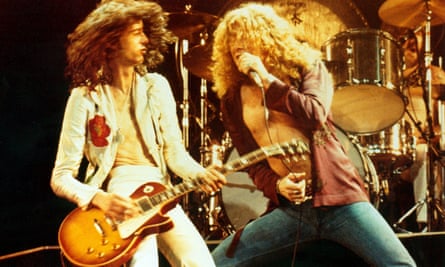There was a time when writing about heavy metal was as lowbrow as the genre’s critical reputation. Scorned by “serious” rock critics, lacking in cultural capital, the metal press was proudly inward-looking, providing for the most part a blokey, boozy, discourse for what the sociologist Deena Weinstein called “metal’s proud pariahs”.
Times have changed. The metal press has upped its game and publications such as Metal Hammer and Decibel publish incisive critical writing. It’s no longer uncommon to see metal discussed in bastions of cutting-edge music and challenging music criticism such as the Wire or the Quietus (Dan Franklin, author of Heavy, contributes to the latter) – and in the Guardian too. There is even a burgeoning academic discipline of “metal studies”.
That metal now attracts serious consideration is, in part, because it has become musically impossible to dismiss. Since the genre burst out of the blues rock of Black Sabbath, Deep Purple and Led Zeppelin in the late 60s, it has come a long way. Metal today is an archipelago of sounds and scenes; from the high art post-metal experimentalism of Ulver, to the ageless resilience of earthier acts such as Iron Maiden. While there isn’t something for absolutely everyone in metal today, there’s certainly something for anyone with a passing interest in rock or, at the other end of the spectrum, a penchant for “difficult” music.

It is becoming increasingly unclear what ties it all together, beyond a fondness for distorted guitar power chords (and sometimes not even that). In Franklin’s book, the key unifying feature is a commitment to being, well, heavy. Franklin sets out to ask why metal music affects him and millions of other people so profoundly. His answer is that heaviness is “full‑on, intimidating, exhilarating and addictive”, a “bloodletting for the excessive soul” and suits a person “who sometimes feels too much and wants to be consumed by sound and fury”. Metal simultaneously offers catharsis of our most difficult emotions and a way of revelling in them. Perhaps such claims are likely to leave the metal-sceptic cold.
Yet what elevates Heavy from being a simple love letter to metal is the way in which Franklin situates heaviness within the “iron-rich bloodline running through the bedrock of culture”. Metal is one way of delving into heavy themes. His discussion of metal is saturated with references to literature, art and music that explore the same territory. He sets out to “re-mystify” metal. The book is a blizzard of analogies and similes as the author pushes language to the limit just as extreme forms of metal push music to the limit. The chapter on troubled ex-Pantera singer Phil Anselmo resounds with metaphors of his failure to escape the weight of heavy existence. The crushing drones of Sunn 0))) take us “to the centre of the earth”. Tool’s journeys into the self, encounters the “heaviness of existence”.
Franklin emphasises the issues with which metal engages. Black Sabbath and Judas Priest were born out of and responded to the falling apart of the industrialised working class. Thrash metal bands in the 1980s such as Stormtroopers of Death and Metallica offered ways of coping with the threat of nuclear war. More recently, nu metal acts Slipknot and System of a Down evoked the anger and despair of the “age of anxiety”. And throughout there is Iron Maiden, whose endless career has managed to reconcile a commitment to British national identity while “flying” free of it on the wings of a global fan community.

Franklin has done very well to write a book that pulls off the trick of offering something to both passionate fans and neophytes. Certainly, metal needs its own The Rest Is Noise, to do for the genre what Alex Ross did for Webern, Boulez and others. While Franklin does not claim to be comprehensive, there are some striking omissions in the book. As one might perhaps expect, there isn’t much engagement with metal that is “light”. There is nothing on the “hair metal” bands of the 80s (Heavy is a Mötley Crüe-free zone), or on the self-conscious silliness of power metal bands such as Gloryhammer. Metal may deal with weighty matters, but sometimes it is just riotous fun. A more problematic omission is any sustained discussion of race and gender. While these themes do come up in passing, and Franklin does not deny metal’s struggles with racism and sexism, he misses the opportunity to discuss the burgeoning impact that women and LGBT people among others are having in redefining heaviness.
Metal today is everything that Franklin says it is. But it is also the female death metal band Castrator, African metal scenes, underground Iranian metal bands, Norwegian black metal star Gaahl coming out as gay … all wrapped up in a global culture that can be as reactionary as it is radical. Still, that Franklin’s approach to metal is a little too weighted down doesn’t detract from his achievement in drawing attention to the potential of heaviness to enrich our lives.
